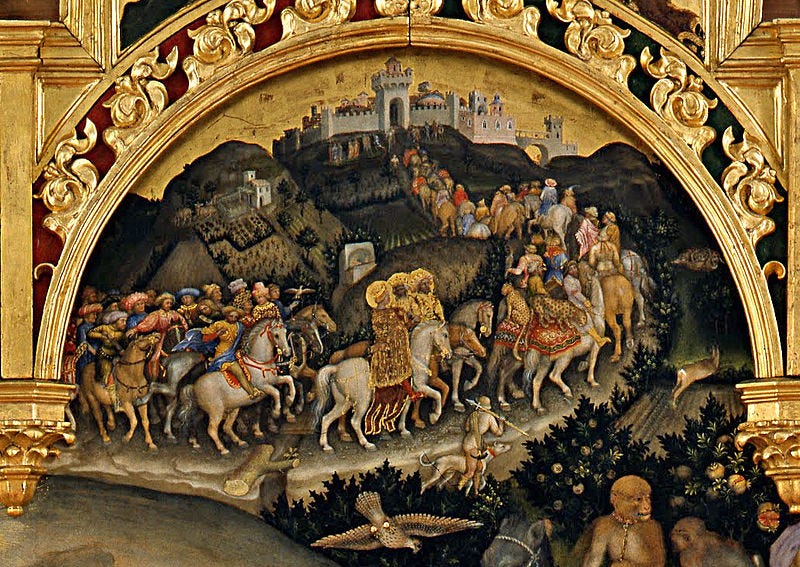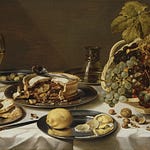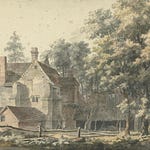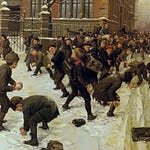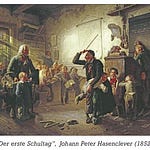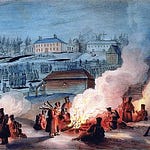A Very Merry Christmas Season from Tony & Debra! Remember that our Christmas Subscription Special continues through Epiphany.
And a Happy New Year to you all as well!
I was a lot of things when I was nineteen years old and taking an introduction to philosophy course at Princeton, but our Word of the Week, sage, wasn’t one of them. I had brains, sure, and I’d help my entry-mates with their calculus and their essays, but I was “just a kid,” as Wally Cleaver of happy memory would say, rather taken aback by the wide world opening out to me, as I’d never had Chinese or Mexican food before, or met anyone from a boarding school, or known a single person who said, “I don’t believe in God.” But I wasn’t as foolish as I might have been.
Just before Christmas in that first semester of 1977, I wrote an essay for that same philosophy class, defending love as a moral absolute against Nietzsche and his adoration of the will to power and glory. I hadn’t any idea at the time that my philosophy professor had blithely skipped over two thousand years, going from Aristotle to Immanuel Kant, as if nothing and nobody that mattered had come between. I knew I couldn’t bring up that one true and only Immanuel, “God among us,” if I was going to do well on the essay. But He was on my mind. Fortunately for me, those were the days before political correctness, and my preceptor said of the essay, “It’s taken my breath away.”
Still, I wasn’t sage. Youth can hardly be that. It requires too much experience of men and manners; knowledge gained from all the mistakes you’ve made, or those you’ve seen other people make; what you’ve learned that works, and not just with machines, but with that most mysterious of organs, the human heart. It’s why when you meet a child with unusual wisdom, you are taken aback, as when, in Dickens’ Dombey and Son, the frail little Paul Dombey asks his father, the great businessman, “What is money?” And Dombey the senior hardly knows what to reply, other than to stammer, “It is the greatest thing in the world.” Mr. Dombey wasn’t sage, either.
The sages from Persia — as we guess, since magus is basically a Persian word — are on their way to Bethlehem. I won’t bring them there today; they haven’t arrived yet. But what made them set out to begin with? And why do we usually portray them as old? It’s because we assume that they have been watching and waiting for a long time, they have been carefully studying the heavens, they have read the Jewish scriptures and thought long about them, even though they are probably not their own holy books. They are venerable. All cultures recognize the worth of such age. If you’re gamol-feax in Old English, you’ve got silver hair, like the old King Hrothgar, and though Beowulf is young and strong and quite shrewd for his years, the elderly Dane gives him wise advice as he leaves to return to his homeland, and Beowulf does appear to follow that advice.
We’re not talking about how to stop up holes in a boat, or how to build a fire outdoors in winter, or what’s the best way to shoot an arrow whose feathers are frozen. We’re talking about a sense that’s hard to express in words. That’s why sage has less to do with speaking than with tasting: it comes from Latin sapidus, describing a man who is wise, that is, he has the taste for something, he can tell by an intellectual taste what is good and what is bad. The adjective comes from Latin sapere, to know, but to know in the sense of being wise, rather than to know a fact, or to know how to perform a task: hence Latin sapientia, wisdom. This verb became the general one for knowing, in the Romance languages: Italian sapere, French savoir, Spanish saber. To savor is to taste, but in a careful and discriminating way. Italian assaggiare, to get a taste of, is from the same source. Distant cousins of the Latin are Old English sefa, mind, and Greek sophos, wise.
If you’re wondering whether the tasty seasoning, sage, is in the same family, that’s a fine guess, but — it isn’t! That sage comes from Latin salvia, a completely different family; those words have to do with being healthy, whole. May you enjoy plenty of both kinds of sage, this joyful season!
Word & Song is an online magazine devoted to reclaiming the good, the beautiful, and the true. We publish six essays each week, on words, classic hymn, poems, films, and popular songs, as well a weekly podcast, alternately Poetry Aloud or Anthony Esolen Speaks. To support this project, please join us as a free or paid subscriber.
Christmas Discount Offers 2023
Upgrade to paid or give a gift subscription now through Epiphany!



